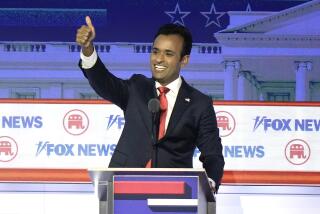Quayle Remarks Appear to Bewilder Audience : Sets Aside Prepared Speech to Digress on Not Trusting Soviets
- Share via
CHICAGO — Republican vice presidential nominee Sen. Dan Quayle, seeking to demonstrate foreign policy expertise, Thursday set aside a prepared address and launched into an informal speech in which he cautioned against trusting the Soviet Union and urged modernization of U.S. and NATO arsenals.
Quayle’s remarks included complex references to missile trajectories and the “force projection” of the Soviet military that left his audience occasionally looking bewildered or bored. The attendees, 400 municipal leaders and members of the City Club of Chicago, applauded three times in his half-hour address.
In his remarks as delivered, Quayle said there had been foreign policy gains in places such as Grenada and Afghanistan during the Reagan years. He also praised the President for the arms-reduction treaty with the Soviet Union, while emphasizing what he said was a need for a skeptical attitude toward the Soviet Union.
‘Jury Out’ on Gorbachev
“The jury is still out” on Soviet leader Mikhail S. Gorbachev’s commitment to reforms in Eastern Europe and whether he will honor treaty agreements and human rights progress, he said.
Later, Quayle described himself as an “agnostic” on the subject of the Soviet Union. “I put myself down as an agnostic because I’m hopeful,” he said.
The seven-page, single-spaced speech, prepared by Quayle’s aides and initially approved by the senator, was designed to showcase him as a substantive candidate with a firm grasp on defense, arms control and foreign policy issues, not incidentally the same issues on which the Republicans consider Democrat Michael S. Dukakis to be weak.
“This is a guy who’s going to show you that he knows his stuff on these issues,” Press Secretary David Prosperi said before the speech.
Draws on Note Cards
But Quayle’s delivery, drawing on notes on 3x5 cards, appeared to blunt what his campaign had pronounced would be a milestone address.
To demonstrate congressional “micromismanagement,” the Indiana senator cited the best-selling book “Red Storm Rising” by author Tom Clancy and the recent Reagan veto of the congressional defense authorization bill:
“The prohibition on anti-satellite testing (included in the bill)--and if you read ‘Red Storm Rising,’ a Clancy fan like I am--you understand the ASAT testing or ASAT capability in that book won the war. And that book, that novel (was) prohibited by Congress.” Quayle apparently meant that ASAT tests, not the book, was prohibited.
Characterizes NATO
Quayle said “the strategy in the Warsaw Pact is to take land, keep land and to have victory. The strategy of NATO is not an offensive strategy; it is a defensive strategy.
“(Indiana basketball coach) Bob Knight told me this,” he said. “He says there is nothing that a good defense cannot beat a better offense. In other words, a good offense wins.”
Quayle then reversed himself and called NATO strategy “not defense.”
In arguing for support of the Strategic Defense Initiative, the space-based defensive weapons system, Quayle asked: “Why wouldn’t an enhanced deterrent, a more stable peace, a better prospect to denying the ones who enter conflict in the first place--to have a reduction of offensive system and an introduction to defense capability?”
Aides later portrayed Quayle’s decision not to read the prepared speech as routine, although they had previously handed out copies of it.
“It was just his style to be able to do it from three by five cards,” Prosperi said.
Concern for Complexities
Another aide said that Quayle was concerned that his audience might not grasp the complexities of the arms control detail in his original speech.
Both denied that the speech represented an attempt at independence by Quayle, who since the beginning of his candidacy has been shepherded by high-ranking Bush campaign officials.
“He stands by the text 100%,” Prosperi said.
Quayle said “the United States and Europe will have to modernize not only our nuclear deterrent but our conventional deterrent. We have to have deterrence, and we have to have peace.”
Quayle also slammed the War Powers Resolution, which states that Congress must be consulted when the President places U.S. troops’ lives and safety in peril, as “unconstitutional.”
Congress, he said, must have an “oversight” role. “But do you need to get into the micromanagement of how many advisers we’re going to have in El Salvador? A number placed on that? . . . I don’t think so.”
More to Read
Get the L.A. Times Politics newsletter
Deeply reported insights into legislation, politics and policy from Sacramento, Washington and beyond. In your inbox three times per week.
You may occasionally receive promotional content from the Los Angeles Times.











